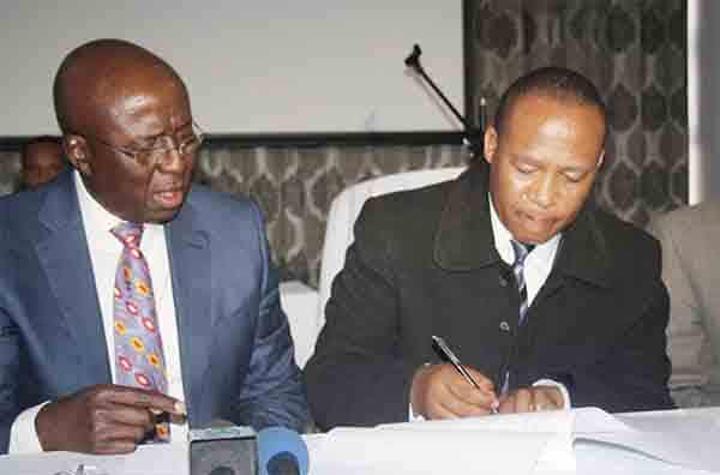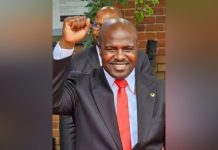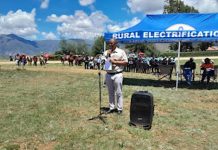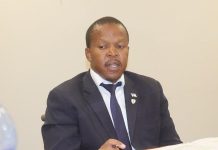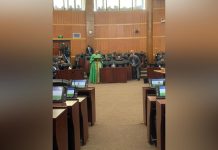Africa-Press – Lesotho. In a frantic bid to safeguard and add impetus to imperiled national reforms, government and opposition parties, yesterday agreed to reopen parliament not later than August 5 to pass legislation establishing the National Reform Authority.
Parliament closed with no appointed date for resumption last month whipping up speculation it was closed indefinitely to stave off a possible no-confidence vote against Prime Minister Thomas Thabane.
“The parties agree to protect and safeguard the progress and milestones that have already been achieved in the reforms progress; the parties commit to remove all the obstacles and impediments which might unduly delay, undermine or derail the reforms process in the Kingdom of Lesotho,” read part of the agreement.
Minister of Water Affairs, Samonyane Ntsekele, signed the document on behalf of government while main opposition Democratic Congress (DC) leader Mathibeli Mokhothu and leader of the Basotho Democratic National Party (BDNP) Pelele Letsoela signed for opposition parties, in and outside parliament respectively.
Southern African Development Community (Sadc) envoy Justice Dikgang Moseneke chaperoned the signing ceremony and signed the deal on behalf of the Sadc facilitation team.
“The parties to this agreement undertake that parliament shall be convened not later than August 5, 2019 for the purpose of enacting the law that establishes the National Reform Authority,” the agreement further read.
It also envisages the establishment of a mechanism or structure to replace the national dialogue planning committee which will have its primary objective as implementation of resolutions and decisions of the second plenary to be held from September 16 to 18.
“Parliament must enact legislation that gives effect to the establishment of the National Reform Authority and must be convened for this intended and specific purpose,” it further read.
The functions of the national reform authority, according to the agreement, will include, amongst others, being a custodian of national reforms, ensuring the implementation of nationals reforms facilitating the implementation of the decisions of the Multi-Stakeholder National Dialogue (MSND).
Later, visiting South African President Cyril Ramaphosa met Prime Minister Tom Thabane at his offices and expressed the hope Sadc’s renewed efforts to end squabbling in Lesotho would start paying off soon.
Although Ramaphosa did not attend the signing ceremony at a local hotel, his presence in the country was proof the region was backing local efforts to hammer out a durable solution to Lesotho’s political instabilities have been established.
He applauded Sadc through Ramaphosa for supporting Lesotho, saying the ongoing reform process will go a long way in helping Basotho find peace. President Ramaphosa commended local political parties for sealing an agreement that would smoothly lead to accomplishment of national reforms.
“This will ensure passing of legislation that would safeguard the entire process of reforms without any hindrances, therefore this convergence of agreement means the nation has a reason to celebrate,” he stressed.
He said this means all parties have agreed to move forward adding Lesotho will no longer be on Sadc agenda, as the upcoming report to Sadc heads of state will note progress made so far.
Official Leader of opposition in Parliament, Mathibeli Mokhothu, endorsed the deal signed yesterday adding it was crucial if reforms were to move forward in the interests of all Basotho.
Before closing for the Winter break, a motion of no confidence against Thabane was filed by the Thabane-led All Basotho Convention (ABC) Member of Parliament for Koro-Koro constituency Motebang Koma’s motion was seconded by MP for Qalabane, Motlalentoa Letsosa, who is also deputy leader of DC.
Koma told Public Eye that he wanted Thabane ousted because “his conduct is a threat to the consolidation of democracy in the country”. He further indicated that the battle for power in the ABC, if left unchecked under Thabane’s leadership, could eventually lead to the gradual decay of liberal democracy in Lesotho.
According to the Constitution, if the National Assembly passes a resolution of no confidence in the government and the prime minister does not within three days thereafter either resign or advise a dissolution, the King may, acting in accordance with the advice of the Council of State, dissolve parliament and call a fresh election.
The DC has called for an early election instead of waiting for the 2022 national election. Its stance is that the alleged rot afflicting Thabane’s government can only be treated through an election that produces a clear winner.
But Lesotho Congress for Democracy (LCD) leader Mothetjoa Metsing, a former deputy prime minister, has argued that until the playing field has been levelled by constitutional and parliamentary reforms, elections would produce a faulty outcome. Metsing has suggested that parties form a Government of National Unity (GNU) to lead the country throughout the multi-sector reforms process.
Movement for Economic Change (MEC) leader Selibe Mochoboroane has, instead of GNU, called for a transitional government whose primary objective would be to ensure the country implements multi-sectoral reforms before going for elections when they are due in 2022.
The ABC faction opposed to Thabane has argued the octogenarian must resign and make way for a new prime minister. Many citizens fear the deteriorating political situation in the country could derail the reforms process.
“Reforms are a necessary step that the country’s leadership and all stakeholders need to take to give the country a new direction.
The current instability underpins the importance of the reforms,” European Union (EU) ambassador Dr Christian Manahl said last month during a breakfast meeting with journalists.
“I am sure everyone now sees how important the reforms are. I hope even those who did not initially see the importance of the reforms see it now.
The reforms are necessary and the process should go on irrespective of what is happening in the country,” Manahl he added. Last week, United States of America ambassador to Lesotho Rebecca E.
Gonzales said failure to implement reforms – the comprehensive, transformative, and inclusive reforms “that Basotho have identified for themselves as the way to reach the Lesotho they want – failure to implement those reforms could have far worse consequences for Basotho than interrupted compact development”.
Gonzales said those consequences could last far beyond the current generation. “When we act like we have all the time in the world, we are really borrowing time from our children and grandchildren.
With the speed and complexity of today’s technology, a moment’s delay can put us years behind,” she said. Lesotho cannot afford such delays, she emphasised.
“Your country’s future cannot be left behind with fingers pointing to a pile of roadmaps or draft legislation collecting dust. All of you here have the power to act, to determine whether or not this country stays on the right path.
“As the representative of your long-standing and most steadfast diplomatic partner, I implore you to take action and move forward with commitment, accountability, and urgency on the reforms process.
The future of your nation depends on it and time is short to demonstrate progress,” she said. Ramaphosa, led a high-powered delegation of South African officials for bilateral talks between the two neighbours.
Finance Minister Dr Moeketsi Majoro, who is acting Foreign Minister in the absence of Mr Lesego Makgothi, told Public Eye at the weekend key among issues to be discussed were matters relating to the Southern African Customs Union (SACU), the ongoing political instability in the country and “many other issues”.
Ramaphosa is the current chairman of SACU – the world’s oldest existing customs union comprising, Botswana, Eswatini, Lesotho, Namibia and South Africa.
With its headquarters in the Namibian capital, Windhoek, SACU was established in 1910 to maintain the free interchange of goods among member countries by providing for a common external tariff and a common excise tariff to the common customs area.
All customs and excise revenue collected in the common customs area is paid into South Africa’s National Revenue Fund to be shared among members, according to a revenue-sharing formula.
South Africa is the custodian of this pool. Only Botswana, Eswatini, Lesotho and Namibia’s shares are calculated, with South Africa retaining the residual.
SACU revenue constitutes a substantial portion of Lesotho’s revenue. This is Ramaphosa’s first visit after he was elected president of South Africa in May.
In September 2014, when he was South Africa’s deputy president, Ramaphosa was appointed SADC Facilitator in Lesotho by the Sadc heads of state following the country’s political and security challenges.
SADC Double Troika Summit that was held in April last year in Angola decided Ramaphosa should continue with the facilitation in Lesotho but recommended that he appoints a high level personality to support him.
He then appointed Moseneke leader of the mediation team to facilitate the political national dialogue and reform process in Lesotho. The reforms were recommended by a SADC-funded commission of inquiry that was established in 2015 to consider the core and contributing factors of the lingering political instability thoroughly.
A raft of constitutional, legislative, security and civil service reforms was recommended by the commission to prevent the country from sliding back into political instability and violence.
For More News And Analysis About Lesotho Follow Africa-Press

